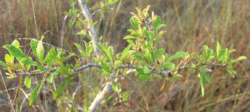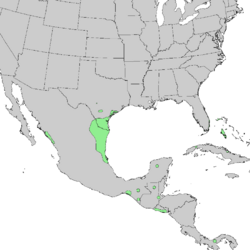Biology:Sideroxylon celastrinum
From HandWiki
Short description: Species of tree
| Sideroxylon celastrinum | |
|---|---|

| |
| Scientific classification | |
| Kingdom: | Plantae |
| Clade: | Tracheophytes |
| Clade: | Angiosperms |
| Clade: | Eudicots |
| Clade: | Asterids |
| Order: | Ericales |
| Family: | Sapotaceae |
| Genus: | Sideroxylon |
| Species: | S. celastrinum
|
| Binomial name | |
| Sideroxylon celastrinum (Kunth) T.D.Penn[2]
| |

| |
| Natural range of Sideroxylon celastrinum | |
| Synonyms | |
Sideroxylon celastrinum is a species of flowering plant in the family Sapotaceae, that is native to Texas [2] and Florida[4] in the United States south through Central America to northern Venezuela and Colombia in South America. Common names include saffron plum[5] and coma.[6][7] It is a spiny shrub or small tree that reaches a height of 2–9 m (6.6–29.5 ft). The dark green leaves are alternate or fascicled at the nodes and oblanceolate to obovate. Greenish-white flowers are present from May to November and are followed by single-seeded, blue-black drupes.[8]
Uses
This plant is known as a first choice deer feed.[6]
Synonyms
- Bumelia angustifolia Nutt.
- Bumelia celastrina Kunth
- Bumelia celastrina var. angustifolia (Nutt.) R.W.Long[3]
- Bumelia spiniflora A.DC.[2]
References
- ↑ IUCN SSC Global Tree Specialist Group & Botanic Gardens Conservation International (BGCI) (2020). "Sideroxylon celastrinum". IUCN Red List of Threatened Species 2020: e.T156753924A156771602. doi:10.2305/IUCN.UK.2020-1.RLTS.T156753924A156771602.en. https://www.iucnredlist.org/species/156753924/156771602. Retrieved 2 November 2022.
- ↑ 2.0 2.1 2.2 2.3 {{citation | mode = cs1 | title = Sideroxylon celastrinum | work = Germplasm Resources Information Network (GRIN) | url = | publisher = [[Organization:Agricultural Research ServAgricultural Research Service (ARS), United States Department of Agriculture (USDA) | access-date = 2009-11-25 }}
- ↑ 3.0 3.1 "Sideroxylon celastrinum". Integrated Taxonomic Information System. https://www.itis.gov/servlet/SingleRpt/SingleRpt?search_topic=TSN&search_value=505216. Retrieved 2011-10-07.
- ↑ Wunderlin, R. P.; Hansen, B. F. "Sideroxylon celastrinum". Atlas of Florida Vascular Plants. Plantatlas.org. http://florida.plantatlas.usf.edu/Plant.aspx?id=2913.
- ↑ "Sideroxylon celastrinum". Natural Resources Conservation Service PLANTS Database. USDA. https://plants.usda.gov/core/profile?symbol=SICE2. Retrieved 14 November 2015.
- ↑ 6.0 6.1 "Common Woody Browse Plants Utilized by White-Tailed Deer in South Texas" (PDF). http://www.tpwd.state.tx.us/publications/pwdpubs/media/pwd_bk_w7000_1675_07_11.pdf.
- ↑ "Woods Roamer: Coma Brushland Fruit". 1 June 2011. http://woodsroamer.blogspot.com/2011/06/coma-brushland-fruit.html.
- ↑ Everitt, J. H.; Dale Lynn Drawe; Robert I. Lonard (2002). Trees, Shrubs, and Cacti of South Texas. Texas Tech University Press. p. 190. ISBN 978-0-89672-473-0. https://books.google.com/books?id=8cEq7weUPYYC.
External links
- "Bumelia celastrina". Digital Representations of Tree Species Range Maps from "Atlas of United States Trees" by Elbert L. Little, Jr. (and other publications). United States Geological Survey. http://esp.cr.usgs.gov/data/atlas/little/bumecela.pdf.
Wikidata ☰ Q7508434 entry
 |


